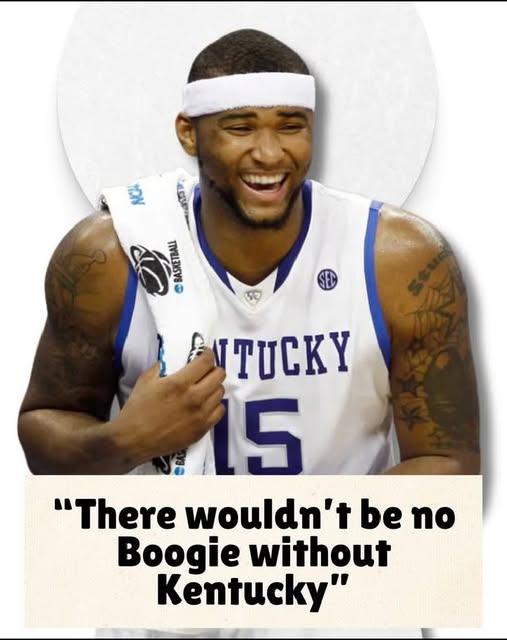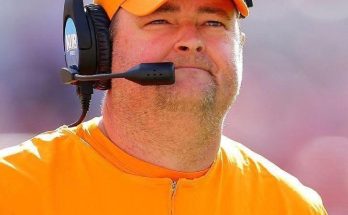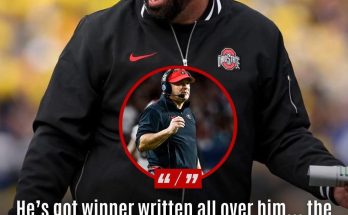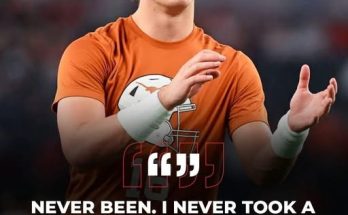In the ever-spinning carousel of college basketball, few names resonate with the same enduring power as DeMarcus Cousins. A fierce competitor, a dominant force on the court, and a personality larger than life, Cousins was once the face of Kentucky’s basketball renaissance under head coach John Calipari. Now, 15 years after his one electrifying season in Lexington, the former NBA All-Star is reflecting with emotion, clarity, and unfiltered love for the place that launched his stardom.
“It was the best time of my life. No question. Kentucky was my everything.”
Those were the words DeMarcus “Boogie” Cousins shared recently during an appearance on the Knuckleheads podcast with Quentin Richardson and Darius Miles, where he opened up like never before about his time with the Wildcats, his brothers in blue, and how that magical 2009–10 season changed everything.
A One-and-Done That Still Echoes Through Rupp Arena
When DeMarcus Cousins committed to Kentucky out of Mobile, Alabama, it was more than just a top recruit joining a storied program — it was a signal that the Calipari era was going to be something different. Alongside John Wall, Eric Bledsoe, Daniel Orton, and Patrick Patterson, Cousins helped usher in the age of the “one-and-done” superteam.
Cousins was raw power wrapped in a 6’11”, 270-pound frame — an unstoppable low-post presence who could dunk with fury, rebound with precision, and flash surprising footwork that reminded fans of NBA legends. During that 2009–10 season, he averaged 15.1 points, 9.8 rebounds, and 1.8 blocks per game, quickly earning SEC Freshman of the Year honors and First Team All-SEC recognition.
But for Cousins, it wasn’t the stats or even the NBA lottery pick status that meant the most.
“People see the games, the highlights, but what they don’t see is the love we had for each other,” he said. “That locker room — man, it was family.”
The Wildcat Brotherhood
If there’s one theme that Cousins emphasized most in his retrospective, it was brotherhood. His voice took on a sentimental tone when speaking about his teammates — especially John Wall, whom he described as “my brother for life.”
“Me and John were on a mission. We both had chips on our shoulders. We didn’t care about rankings or hype — we wanted to change the game, and we did it together.”
Cousins also praised the “underrated glue guys” like DeAndre Liggins, Darius Miller, and Josh Harrellson — names that Kentucky fans still hold dear. These players, he said, embodied the culture that Calipari was building.
“It wasn’t just five stars. It was dudes who sacrificed. We had guys who gave up minutes, shots, money down the line — all for that one goal: to win.”
Though Kentucky fell just short of the Final Four that season, losing to West Virginia in the Elite Eight, the season was a turning point for the program. Calipari’s crew won 35 games, dominated the SEC, and re-established Kentucky as a premier destination for elite talent.
“We didn’t win it all, but we started something that still lives today,” Cousins said. “Look at the banners. Look at the pros. That started with us.”
Calipari’s Impact
Cousins didn’t hold back when discussing Coach John Calipari, calling him “a second father” and “one of the realest people I’ve ever met.”
“Coach Cal believed in me when a lot of coaches wouldn’t. I had a reputation. People said I was ‘too emotional,’ ‘too tough to coach.’ Cal told me, ‘I’ll take all of you — the good and the bad — because I know you want to win.’”
That belief paid off. Calipari gave Cousins the space to be himself, while also holding him accountable — a balance few coaches were able to strike with the fiery big man.
Cousins even revealed that he still keeps in touch with Calipari regularly.
“To this day, he checks in. If I’m going through something, I’ll get a text — ‘You good, big fella?’ That’s real. That’s love.”
NBA Glory and the Pain That Followed
After being selected fifth overall by the Sacramento Kings in the 2010 NBA Draft, Cousins’ professional career got off to a booming start. He was a four-time NBA All-Star, averaged over 25 points per game during his peak seasons, and was widely regarded as one of the top centers in the league.
But a string of devastating injuries — including a torn Achilles, quad, and ACL — derailed what could’ve been a Hall of Fame trajectory. Despite the setbacks, Cousins remains resilient and is eyeing an NBA comeback.
Still, he admits that nothing ever quite matched the joy of Kentucky.
“I’ve played in the league, been an All-Star, signed big contracts, played with legends — but that year at Kentucky, man… that was happiness in its purest form.”
Giving Back to the Program
In 2023, Cousins returned to Lexington to be honored during a Kentucky home game, and the ovation inside Rupp Arena was deafening. Fans still chant “Boogie! Boogie!” and wear his No. 15 jersey with pride.
But beyond nostalgia, Cousins is actively giving back. He’s started mentoring young Wildcats and even hinted at one day joining the coaching staff.
“If Coach Cal ever called and said, ‘Come teach these young fellas how to be pros,’ I’d be there tomorrow,” Cousins said with a smile.
He’s also donated generously to local charities in Lexington and has spoken to current players about professionalism, branding, and handling adversity.
“I tell them, ‘This jersey? It’s more than a uniform. It’s a legacy. You don’t just play for yourself — you play for everyone who wore blue before you.’”
Kentucky’s Lasting Impact on Cousins
What made Kentucky different for DeMarcus Cousins wasn’t just the basketball. It was the fans, the tradition, and the support system he found in a community that embraced him — flaws and all.
“I wasn’t perfect. I had my moments. But they always had my back,” he said. “That’s why Kentucky is home.”
He described his freshman dorm, the team dinners, the late-night practices, and even the time he got in trouble for joking around during shootaround. All of it, he says, made him who he is.
“There’s a freedom and love you get at Kentucky that you don’t get anywhere else. It’s why we all come back.”
The Wildcat Brotherhood Lives On
Today, Cousins still connects with his Kentucky teammates regularly through a group chat that he says is “pure comedy and motivation.” When one of them has a big game in the NBA or needs a word of encouragement, the messages pour in.
“It’s deeper than basketball. We became men together,” he said. “We lived our dreams together. And we still hold each other down.”
That legacy has inspired a new generation of Wildcats — from Anthony Davis to Devin Booker, Tyler Herro, and Tyrese Maxey — who cite Cousins and Wall as their blueprint.
“We walked so they could run,” Cousins said proudly.
What’s Next for Boogie?
Though he’s no longer in his NBA prime, DeMarcus Cousins hasn’t ruled out a return to the league. He’s been training privately and working with teams overseas, determined to end his career on his terms.
Off the court, he’s exploring business ventures, commentary work, and youth mentorship. But whatever comes next, he knows where his heart lies.
“At the end of the day, I’ll always be a Wildcat. That’s forever.”
Final Word: The Wildcat That Never Left
Fifteen years later, the bond between DeMarcus Cousins and Kentucky basketball hasn’t faded — if anything, it’s grown stronger. He may have been a one-and-done, but the impression he left on the program, and the impression it left on him, is lasting.
“Kentucky gave me more than just a platform. It gave me a family, a brotherhood, and memories I’ll carry for life.



